The very nature of serial murder is a pattern of repeated behaviors, resulting in the often violent and brutal death of another. These routines have prompted a comparison to the behaviors of people addicted to drugs or alcohol. Some researchers have suggested that serial murder could, in fact, be a result of addictive thinking, with similarities to behaviors seen within substance addiction.
Serial killers tend to develop habitual characteristics in their killing. A modus operandi in the manner in which they kill and sometimes a signature, a unique aspect within their murders tied to them as individuals. This can be trophy taking, staging of the body after death, or specific acts carried out either during or after the killing.
As a society, we assume individuals who commit brutal murders must be insane, mentally ill to the extent they are not in control of what they were doing and need help. However, this is not always the case. There are many examples of individuals and couples who have chosen to kill, often repeatedly, because they wanted to. John Wayne Gacy, Paul Bernardo and Karla Homolka (The ‘Ken and Barbie’ Killers) and Fred and Rosemary West are just a few.
Reference to serial killers who are addicted to murder is undoubtedly not new but the idea has received relatively little direct attention. Media such as television and film have regularly referred to addiction when portraying multiple murders. A concept that appears to make a good storyline. The hugely popular American TV series ‘Dexter’ has been running since 2006 portraying a blood-spatter analyst who is compelled to kill the perpetrators of crime who are not adequately punished by the legal system and is unable to stop himself from doing so.
Serial Killers and Addictive Behaviour
Some criminologists have highlighted specific behaviors seen by serial killers which can be related to the actions of substance addicts. Helen Morrison and Harold Goldberg for example in their book ‘My Life Among The Serial Killers‘ published in 2005, review many well-known cases such as Peter Sutcliffe, Fredrick West, and John Wayne Gacy, exploring their personalities and behavior through a series of prison interviews.
The authors note that contrary to popular belief, mental illness and an abusive childhood are not necessarily present in all cases of serial murder or should they be considered as criteria for why an individual may go on to kill. They conclude by presenting a theory where due to such environmental factors not being a definitive cause for criminal behavior and murder, genetic predisposition must be the primary factor and indeed this behavior is an addiction. They also theorize that serial murderers have never fully progressed psychologically from infancy, they do not have the same values of right and wrong and have developed a need to kill as a result. This has proved to be a controversial theory, mainly attracting criticism for unsubstantiated claims not based on evidence; however, it is still an interesting one.
Dr. Mark Griffiths, Professor of Behavioural Addiction at Nottingham Trent University states on his blog that he believes an addictive element to serial murder is possible within an addictive cycle, but it is by no means clear-cut. He highlights two books on infamous serial murderers, ‘Killing for Company: The Story of a Man Addicted to Murder‘ about Dennis Nilsen written by Brian Masters and ‘Addicted to Murder: The True Story of Dr. Harold Shipman’, written by Mikaela Sitford. Both of which refer to these serial killers as being in the grips of addiction, driving their repeated murders.
“The urges and compulsions that drive these choices can be surprisingly similar.” Clinical Forensic Psychologist Joni E. Johnston writes in her article “Hooked on Homicide” about people addicted to drugs or alcohol and serial killers.
Johnston further highlights what we can learn from ‘urge-driven disorders,’ disorders which are pushed forward by uncontrollable urges to carry out the behavior such as shoplifting and fire-setting. These behaviors tap into the pleasure-reward systems we have in our brains and release extra dopamine giving the feeling of pleasure. This shot of dopamine as a result of carrying out the behavior in question is what locks an individual into an addiction cycle. When these behaviors are criminal, an individual can end up “having the same difficulty resisting a crime as a substance abuser does resisting his or her cravings.” she says.
Addictive Thinking and Crime
Potentially, repeated criminal offenses may be due to an individual finding the feelings and emotions gained from this behavior addictive and therefore repeatedly returning to this pattern. Abusers of substances often appear to show little interest in the consequences of their abuse, too tightly held by the hold of the substance to see clearly what damage their behavior is doing. For some, even though they are aware continued use of the substance is extremely detrimental to them, they continue using it regardless.

In the same vein, it could be said, some criminals show a similar disregard for the effects of their criminal behavior and the consequences for themselves should they be caught. Many enjoy the chase, the thrill of committing an act they know they are not supposed to and getting away with it. The case of Dr. Harold Shipman, who murdered up to 250 of his patients between 1975 and 1998 is one example and has been reviewed by some researchers who have referred to his ‘addiction to killing‘.
Dr. Esmail wrote in her article “Physician as Serial Killer – The Shipman Case,” “He may have become addicted to killing, experiencing a “buzz” of pleasure from the association with death and the power and control that it gave him.” Owen Dyer wrote in the British Medical Journal in 2002 on the Shipman Inquiry. He quoted the High Court Judge, Dame Janet Smith who led the inquiry into Dr. Shipmans case who said: “I think it likely that whatever it was that caused Shipman to become addicted to pethidine also led to other forms of addictive behaviour…..it is possible that he was addicted to killing.”
An article by CNN in 2012 claims Israel Keyes, who confessed to the murder of eight people, with at least three other suspected, is a “murder addict”. According to the Alaska police who arrested him, this individual did not commit multiple murders because he was mentally ill or unstable or because he had a disturbed childhood which has led to abhorrent behavior. He murdered because he enjoyed it plain and simple. “He was addicted to the feeling he got when he was doing this, addicted to the feel of the hunt and of killing,” said Alaska police Detective Monique Doll.
Ian Brady was an infamous British serial killer, who along with his partner Myra Hindley killed four children after kidnapping and abusing them. Brady controversially published a book in 2001 about his crimes which he called “The Gates of Janus: Serial Killing and Its Analysis”. A rather self-serving attempt at explaining the behavior of serial killers through graphic descriptions of their crimes that were not well received, it was a book that attracted reviewer’s attention out of simple curiosity for what this man had to say. In one such review published in the Internet Journal of Criminology in 2009 by Anthony Metvier, Brady’s claims that the videos and audio recordings he and Hindley made of abuse of the children before they were killed were made to allow them to return to the act and to relive their crimes were highlighted. Furthermore, Brady claimed the act of murder itself held no excitement but was merely “a necessary conclusion to an exercise of power and will.”
Robert Ressler was a prominent criminal profiler working in the FBI Behavioral Sciences Unit and in his book “Whoever Fights Monsters,” he uses the analogy of soap operas or series dramas we watch on TV to highlight addictive properties and compares this to the behavior of serial killers:
“The serial adventures we used to see on Saturdays at the movies. Each week you’d be lured back to see another episode because at the end of each one was a cliff-hanger. In dramatic terms, this wasn’t a satisfactory ending, because it increased, not lessened the tension. The same dissatisfaction occurs in the mind of serial killers.”
Brady similarly refers to murder in his book stating: “With each subsequent killing, the homicidal drug, blunted by habitual use, creates a diminishing and disappointing impression.”
Substance and Non-Substance Based Addiction
We are familiar with addiction concerning alcohol and drugs and the physiological changes in the body that ingestion of such substances causes. The characteristics of addiction include a cycle of stages ranging from craving through withdrawal to relapse, characterized by the term ‘addictive thinking.’
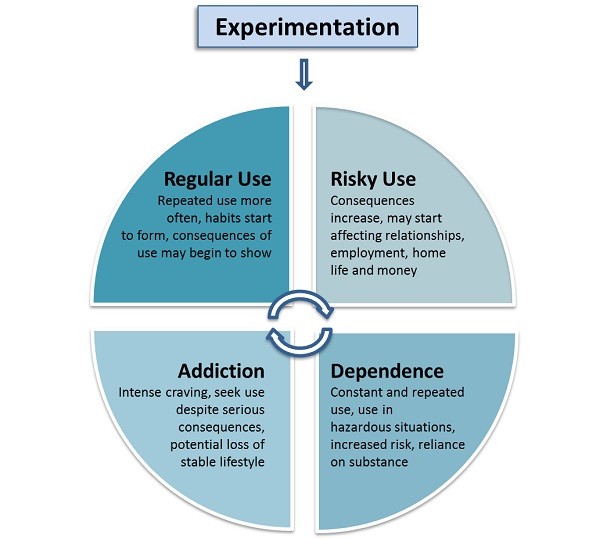
Research has shown that many addictive drugs affect our brains reward system by releasing more of the neurotransmitter dopamine. Dopamine is involved in learning, motivation, emotion and importantly pleasure. Dopamine increases in our brain reward system which gives us the feeling of pleasure. It is believed drugs can cause an increase up to 10 times that of natural rewards such as food, and the brain has to try to compensate by reducing the amount of dopamine receptor cells at the synapse connection, therefore reducing the amount of dopamine that can enter the reward system.
The brain then becomes less responsive to the drug which is why higher doses are needed for individuals to achieve the same level of pleasure, i.e., they become tolerant to the drug. The more a drug is used, the more the brain becomes familiar with it and adapts to account for it.
Areas outside of the reward system are also affected with some regions reducing the numbers of neurons and others increasing the number of neurons producing more connections. In this way brain areas responsible for decision-making, judgment, memory, and learning can all alter under continued drug use.
This suggests an individual can only really become addicted to something that is substance based with addictive properties. However, that is not the case, and addiction is not all physical. There is a substantial contribution from psychological factors such as stress, fear, and anger. Research has shown that addiction to behaviors and actions, rather than substances is entirely possible and is become an increasing problem, for example, gambling.
Similar characteristics are found where an individual experiences cravings for the excitement of feelings induced by the behavior in question. They suffer withdrawal symptoms of stress and mood changes when they are unable to indulge in this behavior. They build up a tolerance level where they need to take more significant risks to achieve the same euphoria and suffer relapses when trying to refrain from the behavior.
Such characteristics mirror those experienced when addicted to substances leading to the suggestion that people can indeed be addicted to a non-substance based activity.
These addictions have become known as ‘process’ addictions and have expanded traditional understanding of pharmacological addiction to something that is not solely physical, but an integrated illness encompassing biological, psychological and social aspects. This does lend support to the idea that criminal behavior could become addictive for some individuals.
Crime and the Addiction Cycle
Serial murder is a continuation, a progression which few of us understand. Addiction is a complex issue encompassing both physiological and psychological factors. Every person is different, and while there may be common characteristics within dependence across substances or activities, each experience will be personal to them.
If gambling, with the thrill of winning, the risk of losing and the knowledge of potential dangers can become an all-encompassing addition, it seems entirely possible that criminal activity could be the same. Committing illegal acts and serial murder does not cost money. It does not require a constant stream of funds to allow it to continue in that way that gambling and substance misuse needs. People can engage in such behavior without losing their jobs, their house, and their relationships as long as they don’t get caught. This may be part of the attraction. Getting away with it, not being caught and being able to continue with regular everyday routines.
If indeed some perpetrators of crime are in an addiction cycle, this has potentially serious ramifications for treatment and rehabilitation. With regards to serial murder, the possibility of addiction playing a part for some opens an exciting avenue for understanding such behavior.
- Dyer, O. (2002). Shipman murdered more than 200 patients, inquiry finds. BMJ : British Medical Journal, 325(7357), 181
- Esmail, A. (2005) Physician as Serial Killer – The Shipman Case. N. Engl. J Med. 352:88. pp1843-1844
- Griffiths, M. (2017) Serial Delights: Killing as an Addiction. Dr. Mark Girffiths Blog
- Johnston, J.E. (2017) Hooked on Homicide. The Human Equation Blog. Psychology Today
- Substance Abuse and Mental Health Services Administration (US); Office of the Surgeon General (US). Facing Addiction in America: The Surgeon General’s Report on Alcohol, Drugs, and Health [Internet]. Washington (DC): US Department of Health and Human Services; 2016 Nov. CHAPTER 2, THE NEUROBIOLOGY OF SUBSTANCE USE, MISUSE, AND ADDICTION.
- Taylor, T. (2014) Is Serial Killing an Addiction? IOL News
Guy, F. (2018, Jun 30) Addicted To Killing: Serial Killers and The Addiction Cycle. Crime Traveller. Retrieved from https://www.crimetraveller.org/2018/06/addicted-to-killing-serial-killers-addiction-cycle











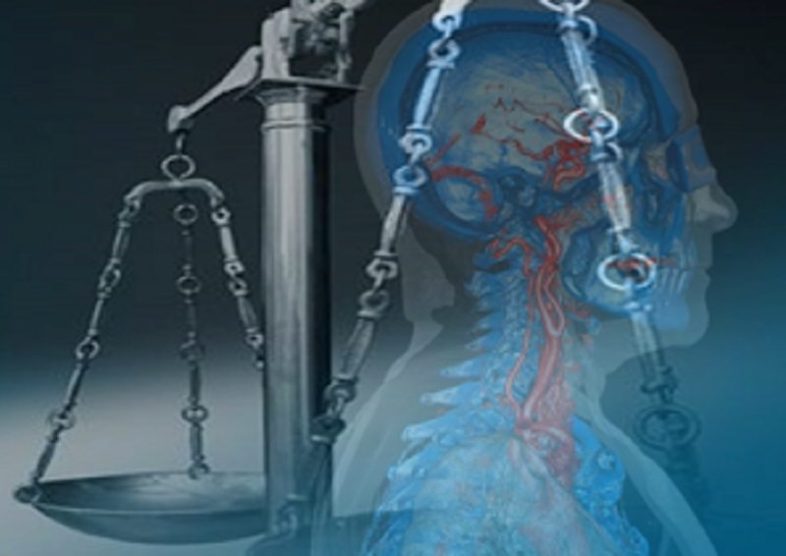

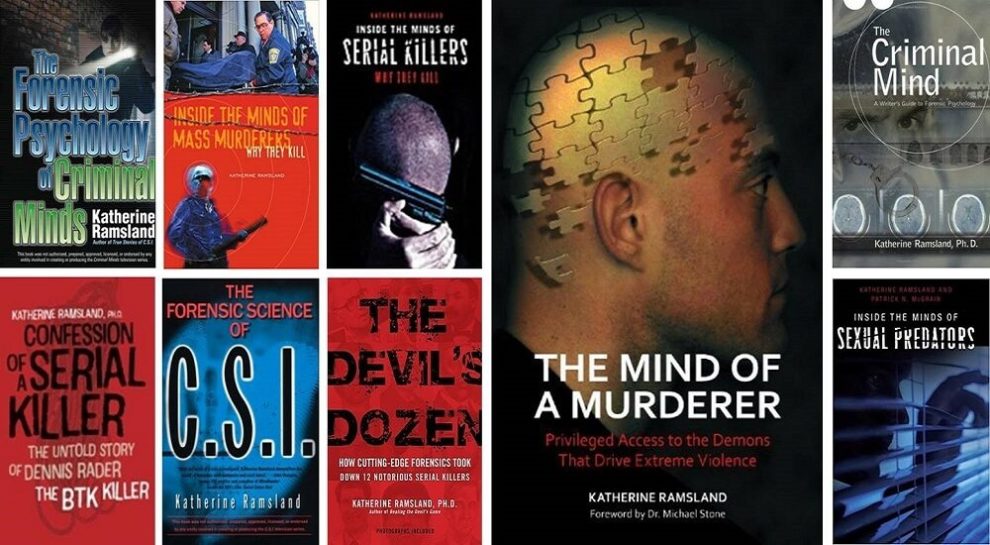

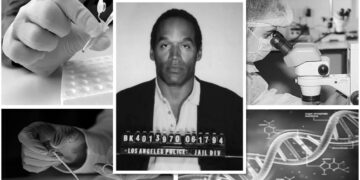












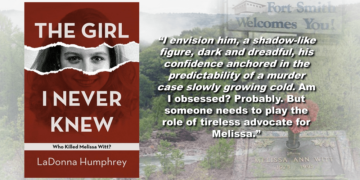
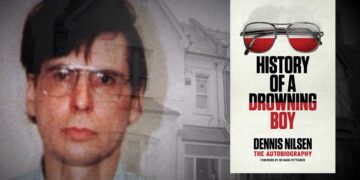
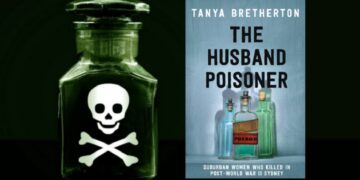
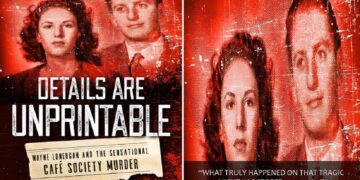











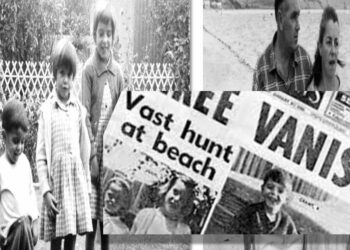
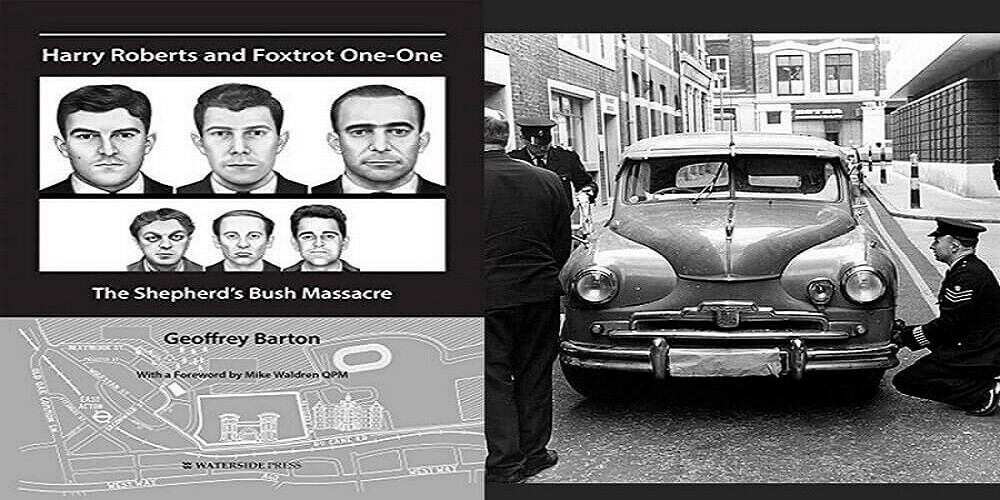



Being addicted to murdering people would explain why serial killers kill again and again. People get addicted to gambling I suppose because of the thrill of winning and the excitement of whether they will win or not. Not too much of a stretch to believe some people get a similar ‘thrill’ from murder. What makes someone like murder though?
I would have never think of Church members to be involved in murder plot..even to actually pay for hire an organized group..somewhere the addictive, the hatered, the resentments or to jusify there actions with petty thoughts (reasons to them). is mentally distrub. But right now I am going through this as I type. The target on my family to get at me is criminial insane. These people have mastermind, this to cover about any aspect, the police, the community members because they are all in relations some way or another, high officals (tribal), church members, you name it just about all these people.